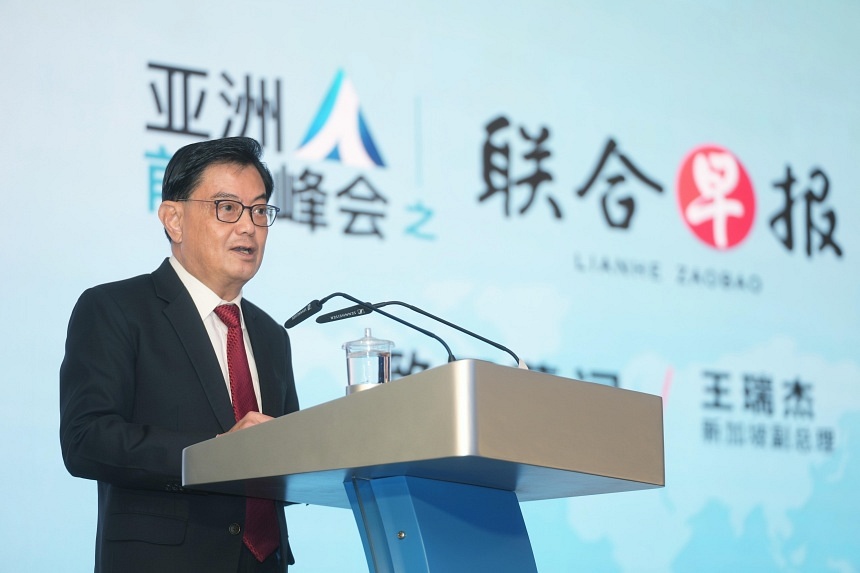As campaigning for the US presidential election ramps up, the United States and China should take steps to prevent existing tensions from escalating, even if both are unlikely to agree on many areas for long-term cooperation, said Deputy Prime Minister Heng Swee Keat at an SPH Media event on Sept 3.
Speaking at the Lianhe Zaobao Conversation, part of SPH Media’s Asia Future Summit 2024, Mr Heng said: “Is it possible for both sides to seek common ground and foster a mutually beneficial relationship amid competition? I believe the answer is yes.”
He noted that in the heated campaigning ahead of the November election, candidates from both the Democratic Party and the Republican Party may point fingers at China.
“Therefore, maintaining an open dialogue mechanism and continuing to build strategic goals are an important way to ease tensions and seek cooperation,” he said.
Mr Heng said he is encouraged by the recent meetings between leaders from China and the US, capped by US National Security Adviser Jake Sullivan’s visit to Beijing in August.
He added that the candidates for the US presidential election may be tempted to rile up voters by highlighting what they see as unfair trade practices; they may also implement protectionist trade measures after they get elected.
If trade friction leads to military conflict between the two nuclear states, that will be a “catastrophe for the whole world”, he said.
Mr Heng noted that both sides want the same thing – for their countries and their peoples to prosper – and have made efforts to upgrade their economies.
He urged the US to be confident about its economy as it has a vibrant civil society, deep capacity for innovation, well-developed financial market and the ability to attract global talent.
But he would like the US to ensure that the fruits of growth reach more people to support economic globalisation.
Mr Heng also hopes China can push for economic reforms to narrow the country’s income gap and promote high-quality economic development, while paying more attention to the training of scientific and technological talent to conduct further research in areas including solar energy and electric vehicles.
“Every economy, especially the advanced economies, must constantly restructure and transform itself in the face of the growth and development of emerging economies. This is the basis for mutually beneficial trade.”
Mr Heng urged the world’s two largest economies, which together account for 43 per cent of the world’s gross domestic product, to work together to tackle global challenges such as climate change and infectious diseases.
“There is much room for cooperation even as China and US continue competing,” he said.
At the event, presented by OCBC Bank and OCBC Premier Banking, Professor Da Wei of China’s Tsinghua University and OCBC’s head of global wholesale banking Tan Teck Long spoke about the impact of the US presidential election on China-US relations.
Prof Da said that if Democratic candidate Kamala Harris wins the election, China-US relations could enter a “new normal” phase that is mostly stable, with a chance that Washington may even “reconceptualise” its relationship with Beijing to move away from “strategic competition”.
But if Republican candidate Donald Trump were to win, Prof Da anticipates it will take at least two to three years longer before relations can stabilise.
When asked by the moderator, Lianhe Zaobao associate editor Han Yong Hong, to say who would Beijing prefer, Prof Da said those who want to see the US lose to China may hope that Trump becomes president – because they think his policies against China, including tariffs, will end up hurting the US more.
But for those who worry that a weak US economy will end up hurting Chinese economy and Chinese jobs, they may not want to see Trump back in power. “If the US suffers, China may not benefit,” Prof Da said.
On Taiwan, OCBC’s Mr Tan thinks that the chance of the US and China fighting an all-out war over the island is very small.
The US and China are, after all, closely linked in many ways and any full-blown conflict will impact not only both countries but also have far-reaching consequences for the rest of the world.
Mr Tan pointed out that when push comes to shove, for example, the US could cut Chinese banks’ access to the international clearing system, and that would be devastating for China’s economy.
For China, its ownership of hefty US government debts could arguably be weaponised for retaliation.

